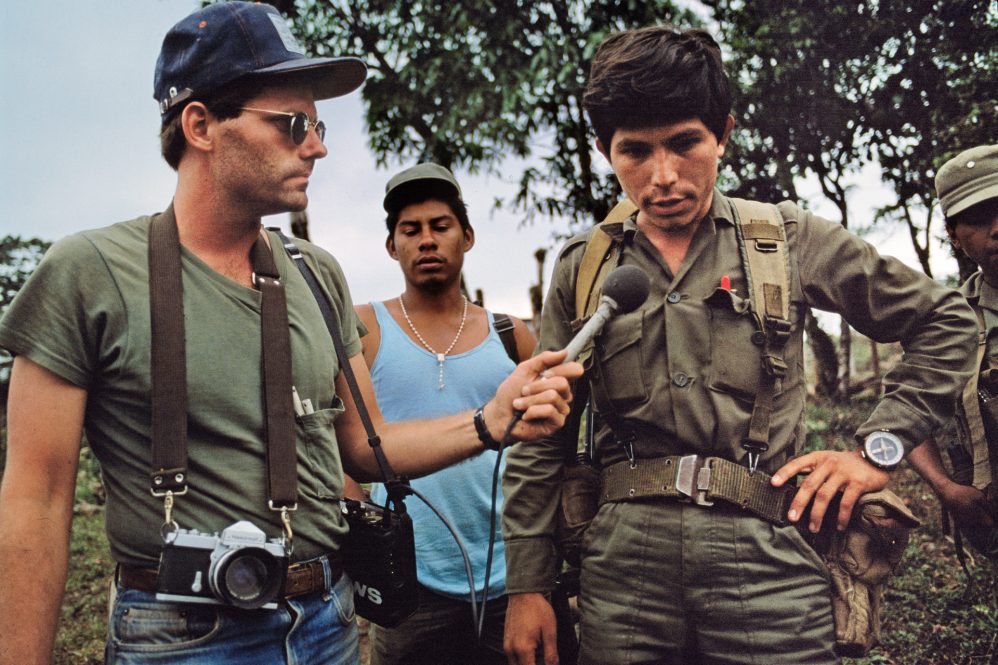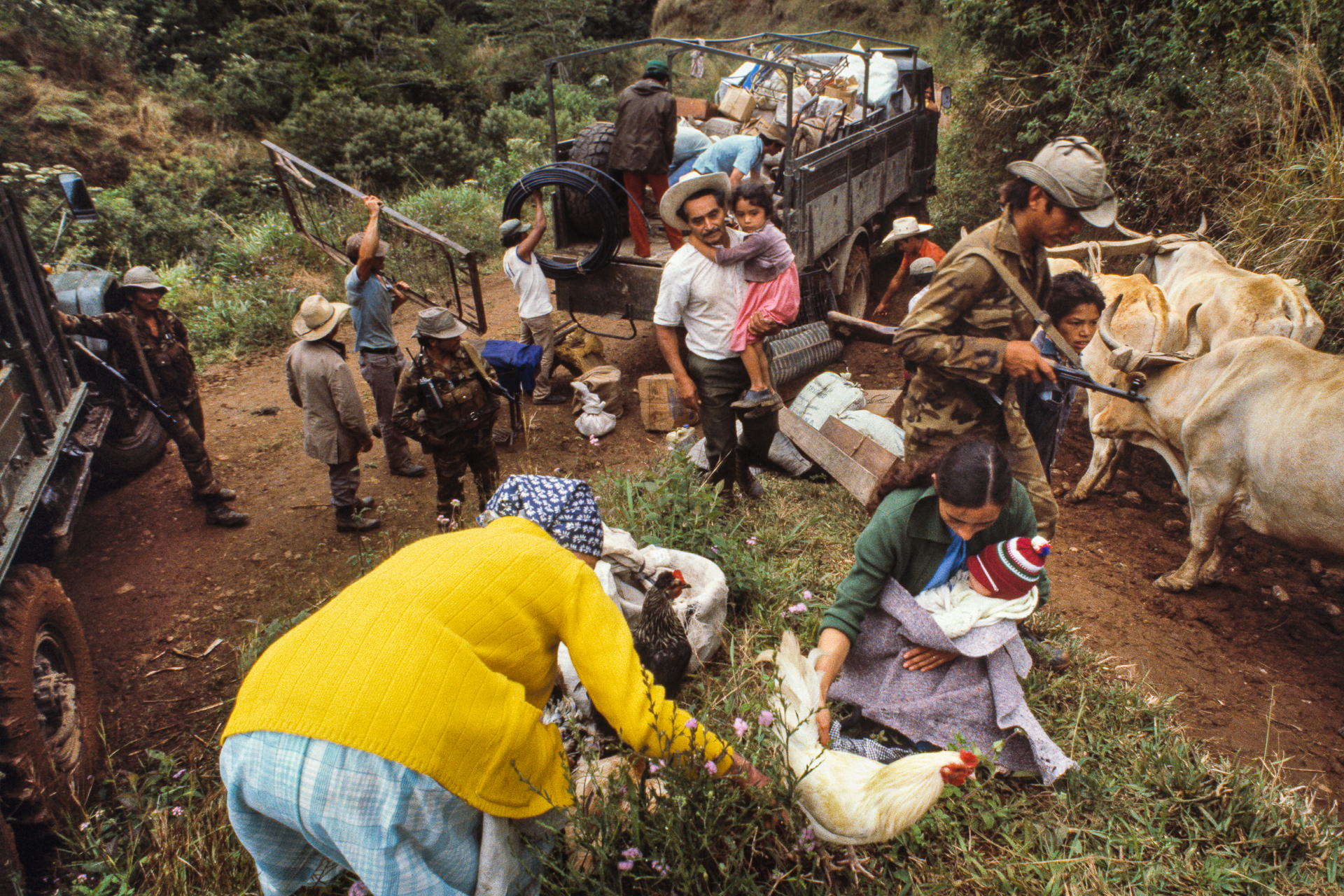It all started with a Polaroid Swinger camera and leather-bound diary

UConn journalism associate professor Scott Wallace interviews a Sandinista officer in Nueva Segovia, Nicaragua, during his time there in 1984. (Photo courtesy of Bill Gentile)
Some six decades ago, when Scott Wallace's parents gifted him a Polaroid Swinger camera and leather-bound diary as a child, the seeds of journalism were planted.
No one knew back then that Wallace, now an associate professor in the UConn journalism department, would go on to become an award-winning writer, television producer, and photojournalist who's reported from places including the front lines of war-torn Central America, jungles of South America, and post-Soviet Russia.
Similarly, no one could have foreseen the foreign policy decisions made by the U.S. during the Vietnam War, from around the same time Wallace opened that gift of a camera and journal, would have an influence on some of today's most divisive issues.
That's the thread woven through Wallace's new historical memoir, "Central America in the Crosshairs of War: On the Road from Vietnam to Iraq," which has won Gold in the Foreward INDIES Awards in the category of political and social sciences, along with a Gold IPPY from the Independent Book Publishers Association as best history book (oversized/coffee table).
He maintains the U.S. government's decisions, denials, and deceit during Vietnam inevitably led to disasters in Iraq and Afghanistan many decades later, coming through the conflicts, civil wars, and revolutions in Central America in the 1980s.
"Our country would be less polarized," he says of what would have happened if the U.S. behaved differently in places like El Salvador, Nicaragua, and Guatemala during those years.
"We would be dealing with a diminished immigration crisis if we had encouraged democracy in Central America and redirected the resources that we gave them for training armies and waging war," he says. "If we instead used those same resources to build up their economies, there would have been far fewer reasons for them to leave. They'd still be there. We seriously contributed to the tearing apart of the social fabric there, and I think a lot of the people who've come here in the last 40 years never would have left their homes."
Wallace sat with UConn Today recently to talk about how he got started as a journalist, his unique perspective as a firsthand witness to war, and his advice to others who want to report from the front lines.
Why have you decided to share your story now?
I was in the middle of a project in Brazil involving the struggles of Indigenous peoples in the Amazon and their efforts to defend their territories and the rainforest from predatory logging and other forms of what passes for development down there. Then, the pandemic hit, and I realized I had to move in another direction if I was to work on a monograph during that time. Even after the pandemic passed, it was near-impossible to gain entry to Indigenous communities. Even into 2021 and 2022, it was still too difficult to get into the territories where I'd been conducting my research. Part of the reason I chose the Central America project was to pivot away from Brazil, at least until it was possible to return to those sensitive Indigenous territories. Secondly, there was a lot I'd been wanting to say for a long time about my experiences as a young journalist in Central America and the abiding relevance of so many issues that have come to the fore today, including immigration and the crisis at the border. Very few people understand how much the issue of immigration from Central America has been driven by our policies from 40 years ago, when we were actively involved in supporting and fueling the military conflicts that were going on down there. It drove a lot of the immigration into the U.S. and made the conditions in those countries so difficult that people left en masse. It's a story of unintended consequences. The third impetus for the project was the very rich trove of images I'd taken while covering those conflicts, most of which had not previously been published, along with detailed notes and compelling stories that have withstood the test of time. Those experiences formed the foundation of my career and what I've ended up doing as a journalist over the last 40 years.
What's one of your 'I-can't-believe-I did-that' experiences from the front lines?
We managed to get ourselves into this rural area of El Salvador in the rebel stronghold of Chalatenango Department, where there had been allegations of a massacre perpetrated by the army that the United States was arming and supporting. We managed to bluff our way past a series of roadblocks, got into rebel-controlled territory, and then got permission from the guerrillas to undertake a journey on foot down into the scene of this atrocity. After most of the day walking, we came upon a dilapidated footbridge stretching across this yawning chasm with a rushing river beneath us. The bridge was such a wreck that, out in the middle, the boards were sagging vertically to the surface of the water, and the wires on one side were basically useless. You had to pick your way across, hand over hand, with your feet on the tops of the boards. The water below was rushing at such a furious speed that the rebels advised us not to look down as we crossed because the rush of the water would make us dizzy, and we'd lose our balance and fall. Had we known what we were getting into, I'm not sure we would have gone there. But by then, we were already so far into the journey there was no going back. When we got to the scene, a horrific stench came from a good way off. It looked like a scene from a plane crash, with clothing and belongings strewn across the brush and hanging from the trees and bodies lying on the ground. It was horrific. I did my best to piece together what had happened from interviews with survivors and what we could see on the ground.
Something like that must stick with you.
I think you develop a little bit of a thick skin, and you just have to move through it. You're there to find out what happened, and your own personal feelings are kind of secondary.

How did you get your start as a journalist?
I was thirsty for adventure and for finding out about the bigger world. I took a year off from college as an undergraduate, and, with advice from some students who were a little older than me and who had done something similar, I lined up a volunteer position in the Peruvian jungle. I went first to Mexico, studied intensive Spanish for the summer, then traveled overland through Central America, down the spine of the Andes, and out into the jungle, where I worked as a literacy instructor in an Indigenous community. During that year I discovered something new about myself. I didn't know Spanish at all before I left, and through the process of having to put myself out there, I kind of developed a new persona as I interacted with Latin Americans and mastered the language and the culture. I loved the music, the people, and the literature. I returned to college after that, doubled up on Spanish classes, and learned how to write it and read it. I also became fascinated with what was going on in Latin America in the news. I was already a few years out of college when it dawned on me that maybe I could make a career as a journalist covering events in Latin America, since I loved writing, taking pictures, and travel. I decided to go back to school to get a master's in journalism with the objective of going to Central America when I graduated. By this time, the early 1980s, Central America was in turmoil. The Sandinistas had taken power in Nicaragua, a civil war had erupted in El Salvador, and the Reagan Administration vowed to 'draw the line' against what it perceived to be communist aggression in Central America. The region was a tinderbox that seemed poised to become a new Vietnam. I knew that no news organization would send a new graduate straight into a big story. I would have to go as a freelancer, so I decided to learn as many skills as I could, because as a freelancer I knew I would have to have as many skills as possible to earn a living: write news stories, take photographs for my stories, sell my photographs to other news outlets. I also got a tip that doing radio for one of the networks was a really good way to establish yourself and bring in a steady stream of work. Just as I was about to graduate, one of my professors, who had previously been a CBS Radio correspondent, introduced me to network executives when they came to campus, and one thing led to another. They didn't have anyone in El Salvador at that time, so I was able to land a gig as their freelance 'stringer' there.
What would your advice be for a journalism student or working journalist who's hungry to do this kind of work today?
It takes a certain kind of person. You have to be passionate about the world, curious about the way the world works. You need to be an avid reader of literature as well as nonfiction, be up on current events, and follow the news closely. In all the writing classes that I teach, I require my students to accompany their stories with images, because everyone should know how to take decent pictures and how to do solid interviews. They should learn how to shoot video and record audio. Of course, now you must have a social media presence and put your stuff out there. It's also very important to make contacts. Ply your professors or the people you meet, go to places where you're going to meet the professionals you admire. Follow them on Instagram. See who's excelling at the kind of work you're interested in and reach out to them. You also should build a portfolio of writing, images, and multimedia. Persistence and patience are also important.
Compared to historians and others who've studied Central America and the conflicts there, do you think you have a unique perspective seeing it all firsthand?
It's definitely a unique perspective, but sometimes I'm a little bit daunted by the intellectual capabilities and rigor of my colleagues in other departments at the University. I think my strength lies in bringing personal experiences and storytelling acumen to the narrative. In June, I was asked to do a presentation at a seminar of academics on genocide and its relationship to 'ecocide' - the criminal destruction of the environment - based on my work covering Indigenous struggles in jungles of the Amazon. I was pleasantly surprised by the positive reception to my presentation, in which I showed my photographs and told stories of people whose lives are impacted and threatened by deforestation, land grabbing, and the violent destruction of habitats and biodiversity. It was a way of bringing abstract concepts down to ground level. I'm not the only one who does that. All my colleagues in the journalism department similarly bring that kind of ground-truthing and storytelling to the subjects they report on.






